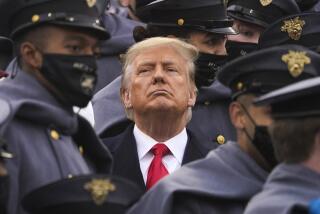Egypt’s overbearing military
- Share via
Last week’s protests in Cairo and Monday’s parliamentary elections represent two faces of post-Hosni Mubarak Egypt, one hopeful and one pessimistic. So far, notwithstanding a huge election turnout, pessimism seems the more realistic attitude.
Despite superficial concessions, the Supreme Council of the Armed Forces seems determined to exercise power even after a new president and parliament are installed. That explains the protests last week in which demonstrators called on the military to relinquish power sooner rather than later. The result was six days of violence in which more than 40 people were killed. As the U.N.’s high commissioner for human rights said: “Some of the images coming out of Tahrir [Square], including the brutal beating of already subdued protesters, are deeply shocking, as are the reports of unarmed protesters being shot in the head.”
The protests might seem a contrast to the elections, the first of three phases of parliamentary balloting. But even Egyptians who voted enthusiastically expressed concern that the military will hold on to power after the election of the new parliament and a new president. (In a gesture to political opponents, the presidential vote has been moved up six months to June.) Statements by the leader of the military council, Field Marshal Mohamed Hussein Tantawi, make it clear that he regards the military as a pillar of the Egyptian state. To some extent, this isn’t surprising. The armed forces played an outsize role under Mubarak and his predecessors and have become accustomed to helping lead the nation.
To recognize the danger of military influence in a new government is not to impugn the honesty and transparency of the elections. It’s hard not to be moved by the sight of long-disenfranchised Egyptians having their say for the first time. The problem is not the elections but the degree of deference the military will accord them. It should respond by renouncing power and accepting civilian control. Any other course is incompatible with modern democracy. It certainly is not what the protesters who overthrew Mubarak expected.
At that time, the protesters generally accepted the military’s assurance that it would rule only temporarily. Now is the time for the armed services to make good on that promise.
Some have called on the military council to transfer power to a transitional civilian government with a nonmilitary president who would serve until the election of a civilian government. If the military wants to identify with the democratic aspirations of the Egyptian people, it will do so.
More to Read
A cure for the common opinion
Get thought-provoking perspectives with our weekly newsletter.
You may occasionally receive promotional content from the Los Angeles Times.






